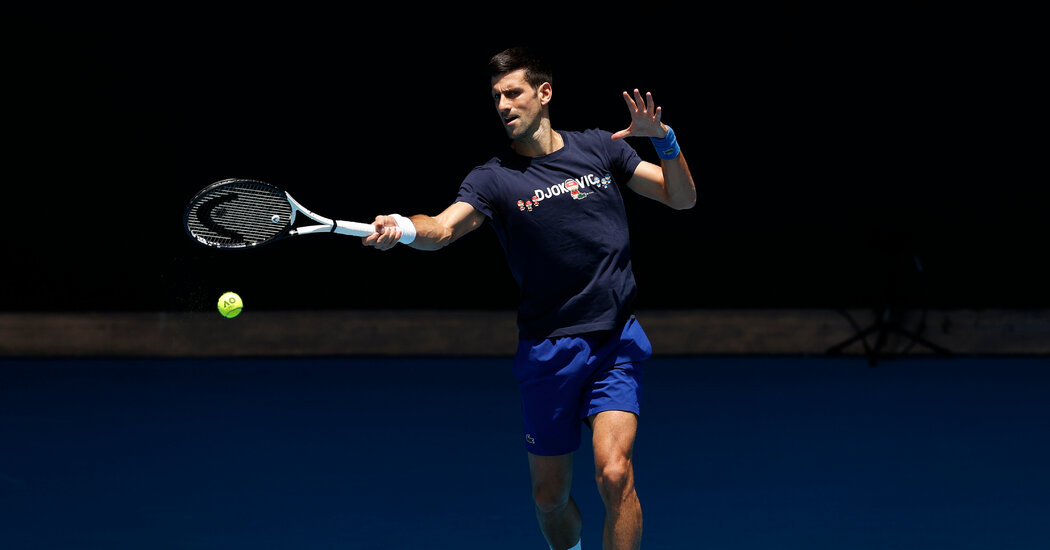The tennis star released a statement that he said would clarify “misinformation” as the Australian authorities weigh whether to deport him.
MELBOURNE, Australia — Novak Djokovic, the top-ranked men’s tennis player, said on Wednesday that he had participated in an interview and a photo shoot in his native Serbia even after testing positive for Covid-19, as the Australian authorities continued to investigate whether he should be deported as a risk to public health.
Mr. Djokovic released a statement on social media that he said was intended to “clarify misinformation” about the weeks before he arrived in Melbourne, where he was detained by Australian border officials before being ordered released on Monday by a federal judge.
But the statement did not fully resolve a range of questions that have swirled over Mr. Djokovic’s quest to remain in Australia and seek a record 21st Grand Slam title. Among them are exactly when he learned of the positive test result, and how his travel documents came to misstate that he had not traveled internationally in the 14 days before his arrival in Australia.
Mr. Djokovic’s statement came as Australia’s immigration minister said he was still considering whether to exercise his personal powers to cancel Mr. Djokovic’s visa again, and as immigration officials were investigating the discrepancies in the paperwork Mr. Djokovic presented as he tried to enter Australia last week with an exemption from a requirement for Covid-19 vaccinations.
That exemption was granted by Australian tennis officials on the basis of what Mr. Djokovic has said was a Covid infection he had in mid-December. He had come under criticism over images on social media showing him at events at the same time he was supposedly infected with the coronavirus.
Mr. Djokovic said on Instagram on Wednesday that he had taken a PCR test on Dec. 16 after some people at a basketball game he had attended two days earlier tested positive for the coronavirus. Despite having no symptoms, he also took a rapid antigen test “out of an abundance of caution,” he said, and it came back negative.
On Dec. 17, he said, as he was awaiting his PCR result, he attended a tennis event in Belgrade, the Serbian capital, where he presented awards to children. He said that his PCR test did not come back positive until after that event.
On Dec. 18, he went ahead with an interview and a photo shoot with the French sports newspaper L’Equipe “to fulfill a longstanding commitment,” he said.
“I felt obliged to go ahead and conduct the L’Equipe interview as I didn’t want to let the journalist down, but did ensure I socially distanced and wore a mask except when my photograph was taken,” Mr. Djokovic said.
“While I went home after the interview to isolate for the required period, on reflection, this was an error of judgment and I accept that I should have rescheduled this commitment,” he added.
It was not the first time Mr. Djokovic has had to apologize for dismissive actions he has taken during the pandemic. In mid-2020, as the virus raged in Europe and elsewhere, he held a tennis tournament after which he and several others tested positive.
While Mr. Djokovic said in his statement on Wednesday that he “had not received the notification of a positive PCR result” until Dec. 17 — after the event involving children — documents he provided to Australian officials as he tried to enter the country said that the result had been returned the day before.
A copy of his medical certificate for his positive PCR test said that the test was taken at 1:05 p.m. on Dec. 16 and that the positive result was returned at 8:19 on the same day. In an affidavit provided to an Australian court, he said, “On 16 December 2021, I was tested and diagnosed with SARS-CoV-2 (COVID).” It was unclear when exactly he learned of his purported positive test.
The Novak Djokovic Standoff with Australia
A vaccine exemption question. The No. 1-ranked men’s tennis player was refused entry to Australia over questions about a Covid vaccine exemption, but Djokovic challenged the ruling in court and an Australian judge granted him entry into the country.
The Serbian prime minister, Ana Brnabic, said this week that had Mr. Djokovic known that he was positive for the coronavirus before attending the awards event on Dec. 17, he would have “clearly violated the rules” in Serbia.
But more information was required, she added, saying, “I don’t know when he received the test result, when he read it.”
When asked what would happen if Mr. Djokovic was found to have breached quarantine rules, she said the Serbian government would “deal with it.”
In his statement, Mr. Djokovic also addressed questions about the declaration he made on his visa paperwork that he had not traveled to any other countries in the 14 days before arriving in Australia. The paperwork warns of serious penalties for false answers to the question.
His declaration had seemed to be contradicted by social media posts showing him traveling between Spain and Serbia. On Wednesday, he said his agent had made an “administrative mistake in ticking the incorrect box.”
“This was a human error and certainly not deliberate,” he added.































